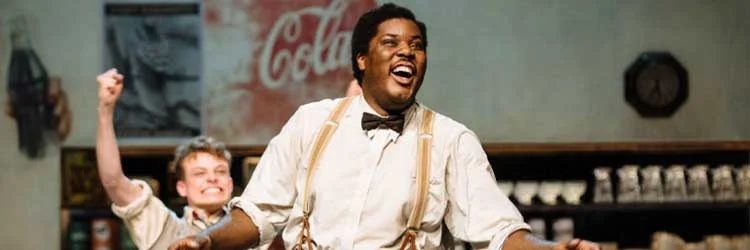Review - 'Master Harold'... and the Boys at the National Theatre
Athol Fugard's 1982 play 'Master Harold'... and the Boys is, in his own words, "probably the most intensely personal thing I have ever written". And a nakedly autobiographical play, based on his own childhood relationship to two black waiters who worked at his mother's tea room (a South African term for park cafe) in his native Port Elizabeth in the Eastern Cape, deserves an autobiographical response from me. I, too, was born and brought up in apartheid-era South Africa - and my childhood self also had close relationships with black domestic workers that have left a complicated, guilt-ridden legacy on me that I have carried throughout my life.
Fugard has been able to resolve, if not absolve, his own guilt by owning it in dramatic terms with this absolutely unflinching portrait of a particularly shaming episode from his childhood. The raw honesty is revelatory and eventually emotionally devastating, but also potentially healing.
Theatre, once again, has the power to heal long-held wounds. And watching it, I was able to reflect on my own guilt and shame, and if there's no expunging it, healing begins with acceptance - and honesty. Fugard's play, written with devastating, unsentimental honesty, has told his own story - but also mine, as he lays bare how the two waiters provided a kind of surrogate parenting to him.
I recognise that myself in my relationship with George Mtetwa, as my family's own domestic servant was called, who worked for my family from before I was born to when we emigrated to England in 1979, leaving him behind to return to his own homeland family several hundred miles away from Johannesburg. Though I was powerless to change that outcome, there's overpowering guilt to his abandonment (and the lengthy separations from his own family that he'd suffered on our behalf throughout my upbringing) that I'll never forget.
But I don't think you need to have your own personal back story to enjoy the tender humanity of this play, or to identify with its sense of injustice and shame. Young Hally (beautifully played by theatrical newcomer Anson Boon, with a very believable South African accent) is shown with a contained sense of hurt and damage as his own absent, alcoholic father is languishing in hospital and his also-unseen mother is trying to reconcile the competing demands of the two men in her life. But for all the closeness and clear affection that the two adult men - Sam Semela and Willie Malopo, to give them their full names - bring to young Athol Harold Lanigan Fugard, it is also a very unequal relationship, in which young Hally can regularly assert his dominant position over the adult employees of his mother.
That's just one alternately chilling and chastening side of this incredibly nuanced and surprising play. Lucian Msamati, one of our very finest stage actors whose previous starring roles at the National include playing Salieri in Amadeus, brings a piercing sadness, suppressed rage and sense of resignation to Sam, the waiter who provides such tender emotional support to Hally, yet also a heartfelt ability to forgive, too. Opposite him, Hammed Animashaun's Willie is a big-hearted, generous man whose kindness shines through, but who has personal demons of his own.
Their complex stories and emotions are held in a stunningly calibrated balance by rising star director Roy Alexander Weise. The production may be a slow-burn initially, but it ignites with an overpowering power that is shattering.
'Master Harold'... and the Boys is at the National Theatre until 17th December.
Photo credit: Helen Murray
Originally published on
